- Home
- Steven Brust
Jhegaala Page 3
Jhegaala Read online
Page 3
"What do you think of those three, Loiosh?"
"Dunno, Boss. If we were home, I'd take the toothy one and the mustached one as merchants. Couldn't guess about Curly."
"That's what I was thinking as well. How come there are no women in this place?"
"I couldn't guess, Boss. Ask someone?"
"I think I will.”
While I was deciding what to ask, who to ask it of, and how to approach it, the problem was taken out of my hands by the guy in the blue felt vest, who came up to my table, glanced at the jhereg on my shoulders, and said, "Mind if I join you?"
I nodded at one of the empty chairs.
He sat down smoothly and held up a hand; in a few minutes, a barmaid came over and brought him a tiny porcelain cup, which he lifted in my direction. "Barash Orbahn. Call me Orbahn."
"Merss Vladimir," I lied, lifting my own. "Vlad."
He frowned a little. "Merss? An unusual name."
"Yes," I said.
He downed his drink and winced, shivered, shook his head, and smiled. I sipped from mine. "What are you drinking?"
"Rakia. Plum brandy."
"Ah. I should have guessed. My grandfather used to look like that when he drank it."
He nodded. "It's imported from the South. I don't know why we import it, or why anyone drinks it. A test of manhood, maybe." He grinned. He had all of his teeth, and they were very white.
I chuckled. "The local palinka is good, and I think safer."
"A wise man," he said. Then, "If you'll forgive me, you have a trace of something foreign in your speech."
I nodded. "I've come here from some distance away."
"And yet, your name is distinctly local."
"Is it?" I said. "I hadn't realized."
He nodded.
"Not surprising," I said after a moment. "I have family from here."
"Family? Or kin?"
In Fenarian, those are different words, with rather more of a difference than in the Northwestern language. "Kin," I said. "Think you might know anyone I might be related to?"
"Hmm. I'll have to think about it. This is a pretty big town, you know."
No, it wasn't. "Yes, it is."
After a moment I said, "No offense to your town, but it stinks."
He smiled. "Yes, I suppose. Believe it or not, after a while you don't notice it at all."
"You can get used to anything, I suppose."
"Indeed."
"Maybe you can tell me something else."
"Sure."
"Why aren't there any women in here?"
His eyes widened. "Women go into taverns where you're from?"
"If they want a drink."
"I see. That, ah, doesn't happen here."
"Why not?"
"Well, because..." He frowned and seemed to be searching for words. "Because it wouldn't be right," he finally said.
I nodded and didn't push it. "What do you do?"
"Beg pardon? Oh. I import and export liquor."
"So the rakia is your fault?"
He smiled and nodded. "I drink it as a sort of penance."
"A man of high moral character, I see."
"Not that high; I'm a trader." He signaled the barmaid and she brought him another. "So, ask me your next question; it seems I am today the man with the answers."
"All right," I said. "Why are the streets so wide?"
"Eh? Are they?"
"Wider than I'm used to. A lot wider."
"Hmmm. Well, the streets you're used to—why are they so narrow?"
"A fair question," I said, "only you claimed to be the one with the answers."
He smiled his smile—it was the sort that makes you think that by smiling he was losing a round. His drink came. He raised it and said, "Welcome to our city and our country, boyore."
I felt my eyebrows climb. "Boyore? Why do you call me that?"
"It's as clear as Doroatya's ankles. You're used to giving orders, and expecting them to be obeyed."
"Am I?" I said. "Interesting."
"Not to mention the rather long piece of steel at your side."
"Yes, I guess that's unusual around here."
"I'll not pass it around, if you don't wish me to; but unless you begin to walk differently, and start looking down a bit more, you can expect the peasants to bow and call you 'my lord' and stand aside when they meet you on the street. But then," he added, "perhaps they'll not meet you at all, what with the streets being so wide."
He laughed a little as if deucedly pleased with his cleverness. I smiled and nodded and sipped my wine.
"Where are you from that women go into bars and streets are narrow?"
"Oh. Sorry, I'd thought it was obvious. I live on the other side of the mountain, the Dragaeran Empire."
"Ah. Yes, I sort of suspected that, but I wasn't sure, and I didn't know if you'd want it known."
"Why not? I can't be the first human to come back here."
"Here? Yes, you're the first one I know of. I've seen a few others in my travels, but they don't stop in Burz. And they don't seem as, well, as aristocratic as you. At least, not until they reach Fenario, or Esania, or Arenthia, and find out they have magic no one else has."
"Mmm. I hadn't thought about that."
"Hadn't you? I assume you have the same sort of magic."
"You seem pretty blasé about magic."
He shrugged. "Not everyone is. You know about the Art we practice; I see signs of it about you. Is it really so different?"
Yes, it was. "No, not really," I said.
He nodded. "I can't tell if you follow the light or the darkness, of course; they, too, aren't as different as many think."
I nodded, wondering what he was talking about. I said, "What generally happens to these people you mention, the ones with the magic no one else has?"
"Usually they set themselves up as minor lordlings until someone, ah, put them down, if you know what I mean. No one has done that around here, though; at least, not in my lifetime. Which is good, because the King never turns his attention this far west, and sometimes the King has to be the one to deal with them?"
I nodded. "Well, if that's what you're worried about, you don't need to. I'm not especially interested in becoming a minor lordling. Or a major one, for that matter."
He studied me. "No, I don't imagine you are." I wasn't at all sure how to take that, so I just let it go past.
We drank for a few minutes, then he said, "It's getting late; I should be going."
I said, "Is there any chance you might be able to find out anything about my people?"
"Sure," he said. "I'll ask a few questions, see what I can learn."
"I'd take that as a great kindness," I said. "Where and when shall I meet you?"
"Right here is good. Say, sometime around noon?"
"Lunch is on me," I told him.
He smiled and stood up. "See you then," he said.
As he walked away, I drank more wine and considered. "What do you suppose he is, Loiosh?"
"Not sure, Boss. I suppose there is always the possibility that he's just what he claims to be."
"No," I said. "There isn't.”
2
Lefitt: But that's a body!
Boraan: I had already come to the same conclusion, my dear.
Lefitt: But, how long has it been there?
Boraan: Oh, not more than a week, I should say. Two at the outside.
Lefitt: A week? How can it have been here for a week?
Boraan: Well, the servants must have been dusting it, or you would certainly have noticed and spoken to them quite sharply about it.
—Miersen, Six Parts Water Day One, Act I, Scene 1
Loiosh was silent for a moment, then he said, "Okay, Boss. What did you see that I didn't?"
"Not saw; heard. Or rather, what I didn't hear. What he didn't ask."
It took him a few seconds. Then he said, "Oh. Right. He should have asked what you were doing here."
"Exactly.”
/> "Maybe he's just polite."
"Loiosh, no one who lives in a small, out-of-the-way town can have a conversation with a stranger without asking what brings him there. It defies the laws of nature."
"Which means he knows, or he thinks he does. You're pretty smart for a mammal."
"Thank you ever so much."
"The jhereg, you think?"
"I intend to assume so until I have a reason not to."
"So, then, what about tomorrow?"
"What's your guess, Loiosh?"
"What we should do is be out of here tonight. But knowing you—"
"And then we'd have him after us and not know where we stood. No. I want him where I can keep an eye on him."
"You're the boss, Boss."
I got up and walked out into the stench and the dark streets, mostly to see if he'd have me followed. As soon as we were outside, Loiosh and Rocza took to the air. I didn't need to tell my familiar what I was doing; we'd been together for a while. My rapier tapped reassuringly at my side. I'd had to reduce the weight I carried before trying the mountains, but I still had a few little surprises concealed about my person; I didn't plan on being easy prey.
The street was pretty quiet, and looked entirely different in the dark. Not sinister, but, well, more like it had secrets it wanted to keep. Lights came from the houses, diffused by the oiled paper. Many were entirely dark, either because there was no light within, or because here in the East, where it is so much brighter during the day, they had perfected shutters. I could hear the tap-crunch of my boots against the well-packed stony dirt of the street. The reek from the paper factory had diminished, though it was still present; it had probably seeped into all the walls and the dirt of the road itself.
"Anyone?"
"Not a soul, Boss."
"Good.”
Sometime while I was walking the wind shifted, and the smell, while still present, became easier to bear. In the stillness, I heard the river lapping against the docks not far away, and chittering of insects. I shivered a little.
This was where my mother had come from; or her people, at any rate. Why had they left? Famine? Disease? Tyranny? Powerful enemies? But whatever had made them leave, this is where they were from, and in a sense, this is where I was from.
And it seemed those who wanted to kill me had tracked me here. How nice.
I found that I was fingering the hilt of the dagger in my left sleeve and stopped doing it. I did, however, touch Spellbreaker, wrapped around my left wrist; where there are Dragaerans, there is sorcery. Spellbreaker's presence was reassuring in spite of the gold Phoenix Stone I bore around my neck, which ought to protect me even if I weren't paying attention. When my life is involved, I like over-protection.
Well, if anyone carried a Morganti blade around here, every witch would know about it. And if a Jhereg—or any Dragaeran—showed up, he'd stand out like Dzur Mountain. I'd once been told that my friend Morrolan had been raised somewhere in human lands, and hadn't known he was Dragaeran—just thought he was a very tall human. I'd never asked him if it was true, but I didn't believe it; the differences were too obvious. No, if a Jhereg showed up in town, I'd know it.
I walked to the other end of the town—it wasn't far, maybe an hour's walk. I reached the tavern I'd noticed earlier; it had a small, neat sign showing a small animal I couldn't identify in the dim light. I didn't go in, but made a note of it for later. No one came out as I walked by.
"Hey, Boss, remember a couple of days ago, you said you were getting too comfortable?"
"Yeah, I guess we don't have to worry about that anymore, do we?"
As far as I could tell, the town just stopped; all of a sudden there were no shops, no buildings, just the road going on, parallel to the river. I turned around and walked back. By the time I returned to my inn, the place was pretty quiet and the guy in the blue vest had gone. I went up to my room and slept.
I was awoken the next morning by a horrid light in my eyes, which I eventually figured out was the Furnace; I had neglected to close the shutters. Shutters are much more important in the East than they are back home.
I stumbled out of bed and dressed. I checked the garrote in the collar of my cloak (wondering why I still carried that; I'd never used a garrote in my life, and wasn't even sure I knew how), the throwing knives and shuriken in its lining, and the few daggers I still carried. After some thought, thinking over what Orbahn had said, I left my rapier in the room. I had enough hardware on me without it, and I wanted to see what would happen if I were less overtly dangerous.
Morning: the Furnace slanting down more sharply than my knives; a few kids playing in the street; the occasional woman, with or without a babe in her arms, visiting a shop; lots of people heading off to work in order to produce ugly smells for miles around. I wondered how much paper they produced at that place. They must ship whole barge full of it down the river. Who needed that much paper? And for what?
Loiosh and Rocza took their places on my shoulders— Loiosh taking the left today. I never knew how they picked who was where, and I wouldn't give Loiosh the satisfaction of asking. I had once thought it was a complicated division of labor; now I'm inclined to think they do it just to make me wonder.
As I walked, I gave some thought to how I was going to go about finding my family. Excuse me, my "kin." Two months ago, it would have been easy. I'd have said, "Kragar, find out if I have any family in this village." He'd have made a couple of snide remarks, and a few people would have been bribed, and a few threatened or slapped around, and I'd have had my answers. Now I had to do it myself. I had an image of walking through the area stopping at every peasant's shack and saying, "Ever heard the name 'Merss' before?" I didn't like it much. A few untended kethna wandered around on their undersized cloven hooves, snorting and snuffling and looking for victuals. Presumably, they were owned by various people; I wondered how their owners told them apart. Were kethna smart enough to know where home was? If so, and given their ultimate fate, were they smart enough not to go there?
Across the street, a chubby guy with a fringe of white hair was raising a wooden awning, supported on two posts, and it came to me that this was so people could stand in front of his shop without the light of the Furnace blinding them. I guess I was just beginning to realize how much having the Furnace blazing down affects everything you do. I would have to try to stay aware of that.
I crossed over to him. He gave me the usual merchant appraising glance, the one where he's decided if you might actually buy something. He didn't seem especially excited by me, but managed a nod. Hanging from hooks and sitting on sturdy tables were teapots, coffeepots, hinges, cups, boilers, and even some engraved plates, all of them in that reddish gold color. I warmed to him; I always admire people who can make things.
"You're a tinsmith," I said.
He raised an eyebrow and sniffed. "Hardly, I'm a respectable merchant and a member of the Guild. All of the tinsmiths sell through this shop, or they don't sell around here."
Suddenly I wanted to see how many coffeepots I could shove down his throat. I said, "I see," and continued looking around the shop. He watched me like I was going to steal something. I was tempted to, just on principle.
"Boss, remind me again why you won't kill an Easterner."
"I never said I wouldn't kill an Easterner. I said I won't accept money to kill an Easterner."
"In that case—"
"I am not killing him, and no, you may not eat him even if I do. Besides, that much fat would be bad for you."
I studied the wares, careful not to touch anything, because if he'd said anything about "handling the goods" I would have killed him.
"The Guild," I repeated.
"Yes, young man. So watch your step."
"I'm new in town. What guild is that?"
He sniffed. "The Merchants' Guild, of course."
"Ah. Of course."
"Boss—"
"Hush. I'm working" I gave the guy the sort of smile that means nothing a
nd said, "This is a local Guild, or is it part of a larger Guild throughout the country?"
He gave me what I'm sure he thought was a Penetrating Stare. "Why would you want to know that?"
"Just curious."
"Why do you want to know that?"
"Just curious."
It was interesting, though. Last night, there was someone who had just assumed I was an aristocrat; and now this guy just assumed I was some sort of thug, or criminal. I hate it when people make those kinds of assumptions about me. It makes me want to break their legs.
I said, "Does the name Merss mean anything to you?"
His scowl deepened. "Are you threatening me?"
"No."
"I don't respond to threats, young man."
"That's good, because I don't issue them."
"I think you had best leave my establishment."
Establishment. He had an establishment.
I shrugged and walked out because I didn't think staying would be productive, and because that was probably the last thing he expected me to do.
"That," I told Loiosh, "was one of the more interesting conversations I've had in a life full of interesting conversations."
"Meaning you have no idea what just happened, right?"
"Right. Only something did. Didn't it?"
"Sure, Boss. Is there a reason you think it might be connected with what you're looking for?"
"Loiosh, I mentioned the name of my family and he thought I was threatening him."
He didn't answer.
I walked down the street about ten paces before I was hit with a wave of nostalgia like I hadn't thought I could feel. I was standing in front of a tiny little place, with what looked like a fresh coat of dark green stain on the thin-looking exterior, and no window, and a doorway covered by a thick curtain of pale wool. Hanging from the low eaves were herbs: mistletoe, koelsch, thyme, spinnerseed, eddieberry. My grandfather's shop had looked different, but smelled the same. I stood outside for a moment, feeling the smile on my lips, then pushed aside the curtain and went in.

 Phoenix
Phoenix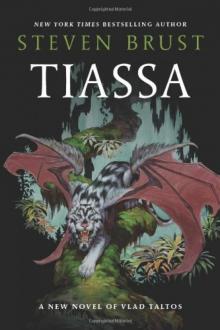 Tiassa
Tiassa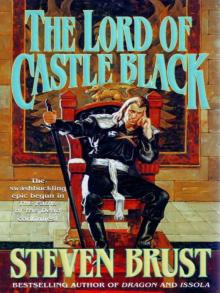 The Lord of Castle Black
The Lord of Castle Black To Reign in Hell: A Novel
To Reign in Hell: A Novel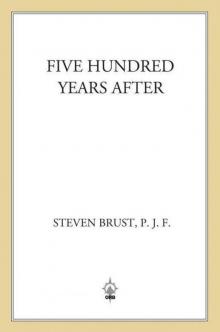 Five Hundred Years After (Phoenix Guards)
Five Hundred Years After (Phoenix Guards)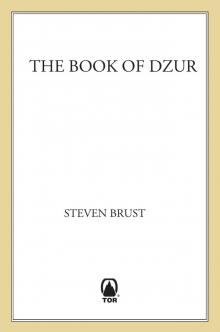 The Book of Dzur: Dzur ; Jhegaala
The Book of Dzur: Dzur ; Jhegaala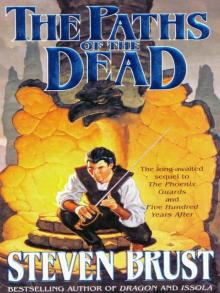 The Paths of the Dead
The Paths of the Dead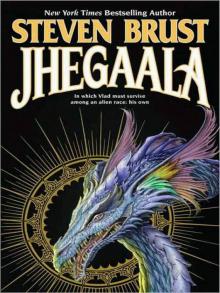 Jhegaala
Jhegaala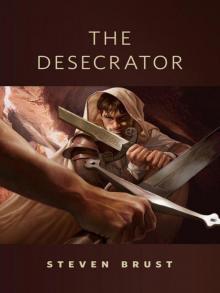 The Desecrator: A Tor.com Original
The Desecrator: A Tor.com Original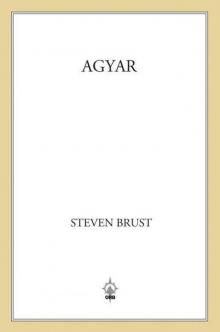 Agyar
Agyar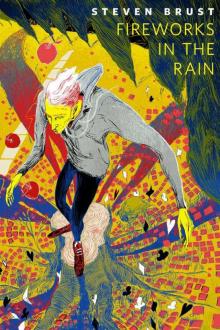 Fireworks in the Rain
Fireworks in the Rain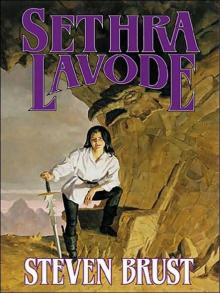 Sethra Lavode
Sethra Lavode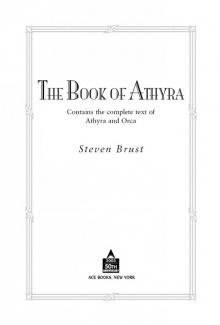 The Book of Athyra
The Book of Athyra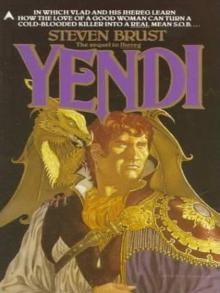 Yendi
Yendi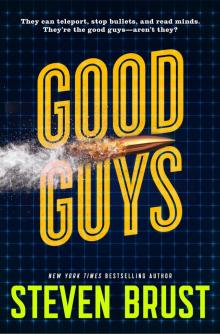 Good Guys
Good Guys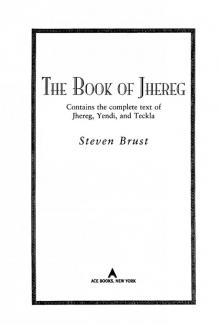 The Book of Jhereg
The Book of Jhereg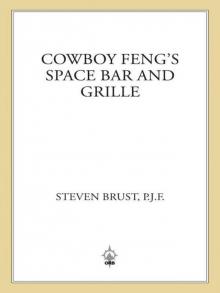 Cowboy Feng's Space Bar and Grille
Cowboy Feng's Space Bar and Grille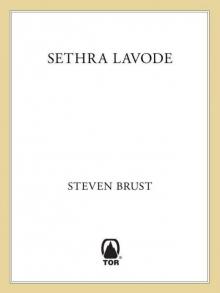 Sethra Lavode (Viscount of Adrilankha)
Sethra Lavode (Viscount of Adrilankha) My Own Kind of Freedom
My Own Kind of Freedom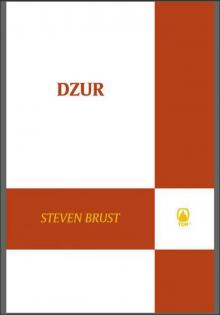 Dzur (Vlad Taltos)
Dzur (Vlad Taltos)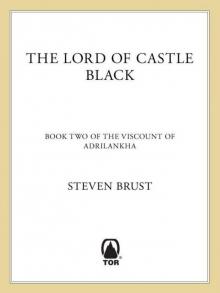 The Lord of Castle Black: Book Two of the Viscount of Adrilankha
The Lord of Castle Black: Book Two of the Viscount of Adrilankha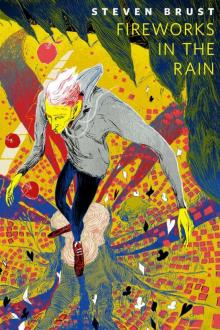 Fireworks in the Rain: A Tor.Com Original
Fireworks in the Rain: A Tor.Com Original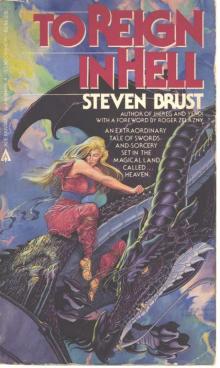 To Reign In Hell
To Reign In Hell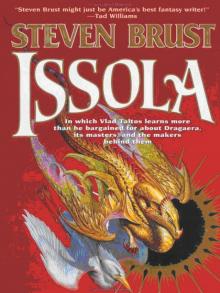 Issola
Issola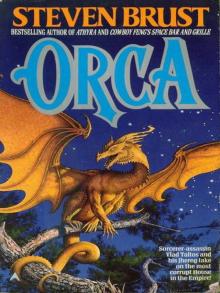 Orca
Orca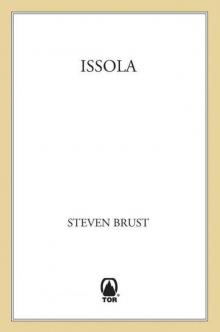 Issola (Vlad Taltos)
Issola (Vlad Taltos)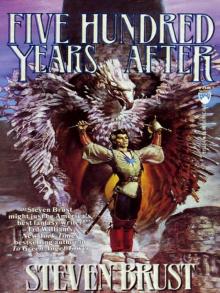 Five Hundred Years After
Five Hundred Years After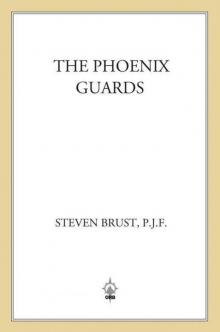 The Phoenix Guards
The Phoenix Guards Taltos
Taltos![[Vlad Taltos 06] Athyra Read online](http://i1.bookreadfree.com/i1/03/24/[vlad_taltos_06]_athyra_preview.jpg) [Vlad Taltos 06] Athyra
[Vlad Taltos 06] Athyra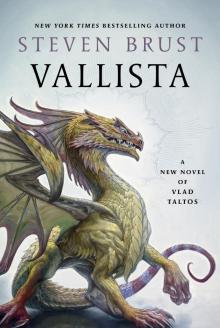 Vallista--A Novel of Vlad Taltos
Vallista--A Novel of Vlad Taltos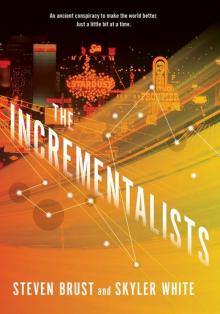 The Incrementalists
The Incrementalists![[Vlad Taltos 04] Taltos Read online](http://i1.bookreadfree.com/i/03/24/[vlad_taltos_04]_taltos_preview.jpg) [Vlad Taltos 04] Taltos
[Vlad Taltos 04] Taltos![[Vlad Taltos 03] Teckla (v 1.1) Read online](http://i1.bookreadfree.com/i1/03/27/[vlad_taltos_03]_teckla_v_1_1_preview.jpg) [Vlad Taltos 03] Teckla (v 1.1)
[Vlad Taltos 03] Teckla (v 1.1)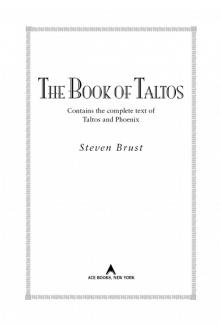 The Book of Taltos
The Book of Taltos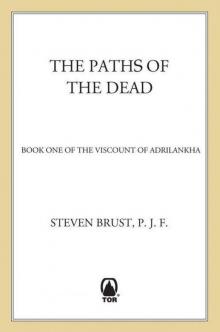 The Paths of the Dead (Viscount of Adrilankha)
The Paths of the Dead (Viscount of Adrilankha) Jhegaala (Vlad Taltos)
Jhegaala (Vlad Taltos)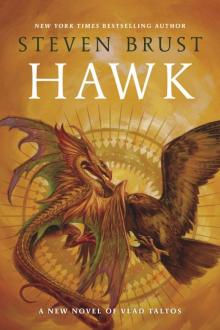 Hawk (Vlad)
Hawk (Vlad)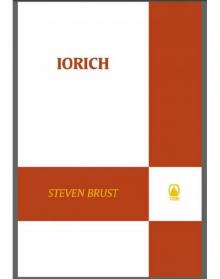 Iorich
Iorich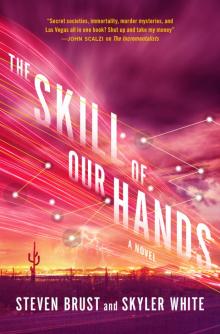 The Skill of Our Hands--A Novel
The Skill of Our Hands--A Novel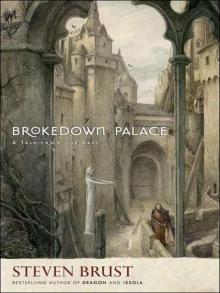 Brokedown Palace
Brokedown Palace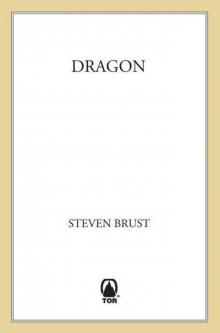 Dragon (Vlad Taltos)
Dragon (Vlad Taltos) Dragon
Dragon Athyra
Athyra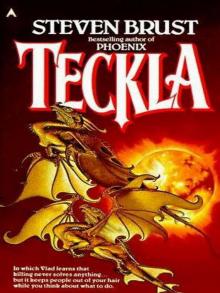 Teckla
Teckla Dzur
Dzur